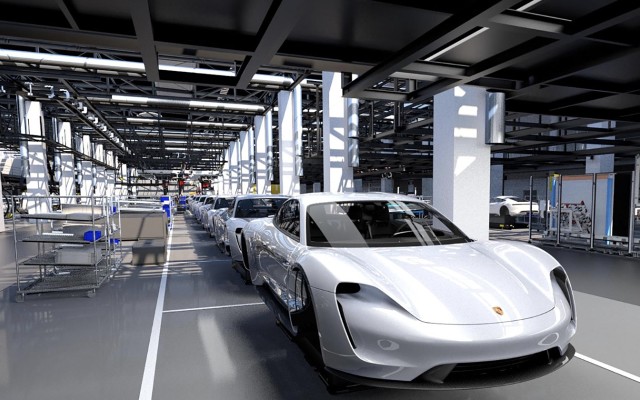Porsche’s new electric vehicle charges in 20 mins, increased range and faster charging to come

Porsche CEO Oliver Blume claims the new all-electric Taycan model, due early 2019, can travel 400km with just a 20min charge.
For all the upside electric vehicles (EVs) offer, there is a niggling downside which has potential owners worried about their next generation investment.
It’s known as “range anxiety” and refers to the very real concern held by some converts over how many kilometres their EVs will cover before they risk running on empty.
Related to that concern is the time it takes to “refuel” or recharge a plug-in EV.
Unlike a conventional vehicle which can be quickly topped up with a few hundred kilometres worth of fuel, an EV can often take hours to draw enough electricity from the grid to take a car less than half that distance.
Research by Ergon Energy shows owners of the new Nissan Leaf for example, can expect a 240 volt charging time of six hours to deliver a range of around 150km, while the BMW i3 101 will power up to 80% in eight hours for 190km.
The Tesla Model S is the current standout, with a full charge time of less than four hours promising to deliver an approximate range of 500km.
Other industry research has shown that it’s not the vehicle itself that stops people from making the leap to electric motoring – rather, it’s the uncertainty about charging durations and distance delivered per full charge that holds them back.
There is a substitute
German luxury carmaker Porsche plans to be the exception to the low distance-long charging rule, when it releases its first all-EV in the new year as a substitute to its flagship combustion engine-powered 911.
While the company plans to continue sales of the 911 for “as long as possible”, it said the new four-door Taycan sports coupe will offer EV drivers the best of both worlds when it hits the market in 2019 – an increased range of around 400km with a charging time of less than 20 minutes.
Rumoured to be priced above $100,000 for the base model, the vehicle will be powered exclusively by an 800 volt DC fast-charging system capable of delivering a charge rate of up to 350 kilowatts – or double the voltage of most EVs – and, potentially, an 80% charge in only 15 minutes.

After four minutes on DC charge, Porsche’s Taycan EV can travel 100km before running empty.
Porsche’s engineers have yet to decide which voltage level the rest of the car will use.
The advantage of using 400 volt is that more “off the shelf” parts are available from suppliers and existing high-voltage parts such as cabin heaters can be reused from earlier 400 volt vehicles like the VW e-Golf.
What the company has committed to however, is that the new EV will not compromise on the “refined performance” the marque has become known for.
“The Taycan drives like a Porsche, looks like a Porsche, and feels like a Porsche – it just happens to have a different type of drive,” said Porsche’s head of battery-electric vehicles Stefan Weckbach.
“It will offer reproducible performance and a top speed which can be maintained for long periods, representing a real treat for any driver.”
The race to charge faster
Porsche is not the only manufacturer to be offering faster EV charging options.
Companies worldwide have joined the race to develop DC fast-chargers that promise increased range in increasingly-reduced timeframes.
DC fast-chargers bypass an EV’s onboard charger – converting grid AC power to DC power outside the car – and deliver electricity directly to the battery at a higher rate than onboard chargers would allow.
In April, Swiss engineering firm ABB announced it had created the world’s fastest EV charger, known as the Terra High Power DC.
The 350 kilowatt charger claimed to deliver the average electric car 193km of range in just eight minutes – almost three times faster than the rate of Tesla’s Supercharger stations.
Closer to home, Australian start-up Chargefox last month raised $15 million to establish an “ultra-rapid” EV charging network across the country.
Billed as the “the world’s first solar and battery storage 350 kilowatt charging stations”, they will be available to all EVs and enable ranges of up to 400km, or up to 80% capacity, in just 15 minutes.
Eighteen stations have been planned at 200km intervals along the main highway linking Brisbane, Sydney, Canberra, Melbourne and Adelaide.
A further three stations will be built near Perth and all will be powered by renewable energy.
The Australian Federal Government has injected $6 million into the initiative via the Australian Renewable Energy Agency.
While the number of charging points per station is yet to be confirmed, the initiative has been welcomed as a step in the right direction to keep the EV momentum going.
Earlier this year, a public inquiry into the uptake of EVs in Australia heard how Australia’s mining sector could benefit from having more of the new generation vehicles on the road.
In a report produced by the Association of Mining and Exploration Companies, it was estimated that Australia’s lithium value chain – which includes raw materials through to cells and battery packs – could increase from $165 billion to $2 trillion by 2025 if more EVs were introduced.
